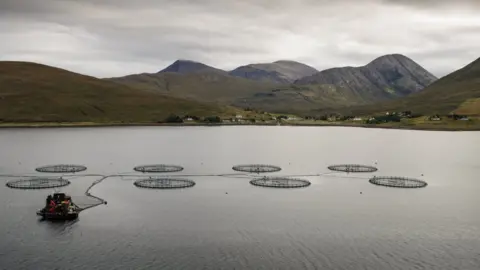Scots salmon producers report difficult start to year
 Getty Images
Getty ImagesScottish salmon producers have reported a difficult start to the year, forecasting an 11% drop in output for 2018.
Strong prices for Scottish salmon have failed to compensate for low harvests and problems with sea lice and disease.
An industry insight published by the Sal-Mar salmon farming company said total UK production was down 13%.
The report stated: "After several quarters of growth, the situation in the UK is expected to reverse in 2018."
It added: "In the first quarter, the harvested volume fell by 13% compared with the first quarter of 2017.
"In the second and third quarters, output is expected to decrease by 15% and 11% respectively."
Sea lice
That would be the lowest production figure for eight years.
Marine Harvest, the world's and Scotland's largest salmon farmer, reported a very steep drop in its Scottish haul, falling by more than half in the first three months of last year to 8,700 tonnes.
In its report to investors, the firm said the fall was "due to lower opening biomass, as a consequence of biological challenges and lower production, and timing of smolt stockings".
The cost of treating sea lice and disease in salmon was up 43% per kilogram harvested, "mainly due to increased health costs, mortality and negative scale effects".
Sea lice are a problem in many of the company's sites, but it faced specific incidences of fish anaemia and fish damaged in a storm during the first quarter, at a cost to Marine Harvest of 1m euros (£870,000).
Operational pre-tax earnings went from 55m euros (£48m) last year to only 16m (£14m) this year.
Fish grown slower
Earnings per kilogram, a key industry measure, fell less steeply, from 3.12 euros to 1.85 euros (£2.72 to £1.61).
Prices were 12% above last year, mainly due to higher contract prices this year.
Production from Scottish salmon farms owned by Marine Harvest was lower due to storms and low seawater temperatures, meaning fish have grown slower.
According to the firm, "the biological performance has been challenging for our Scottish operations".
It said the situation is not expected to improve significantly in the next quarter, and costs are expected to remain high also in the second quarter of 2018.
A more positive quarterly report came from the Scottish Salmon Company which reported its harvest was up from 5,685 tonnes at the start of last year to 7,138 tonnes, with revenue up from £35m to £43m.
Earnings per kilogram were only slightly down at £6.08.
